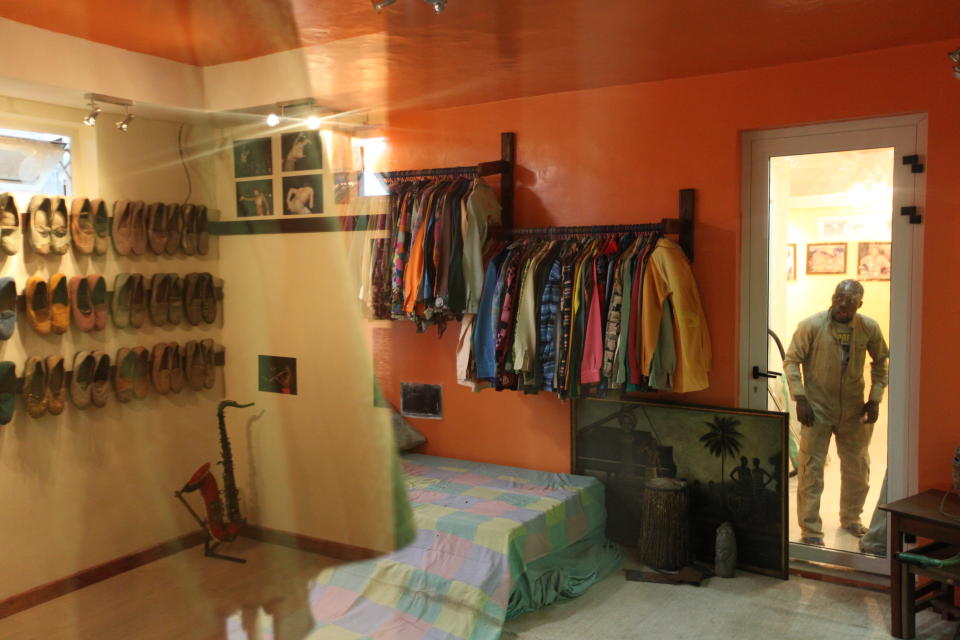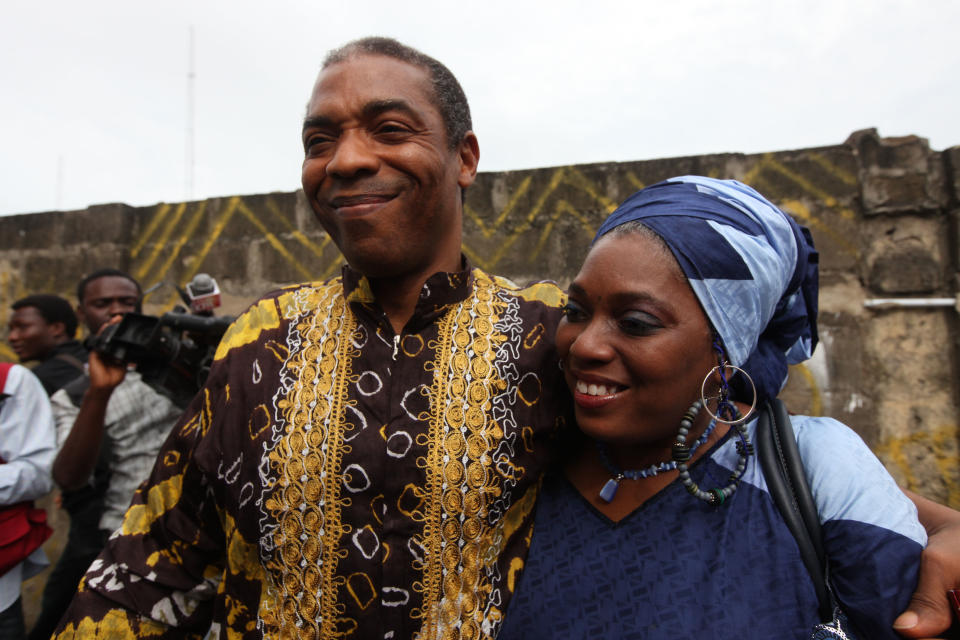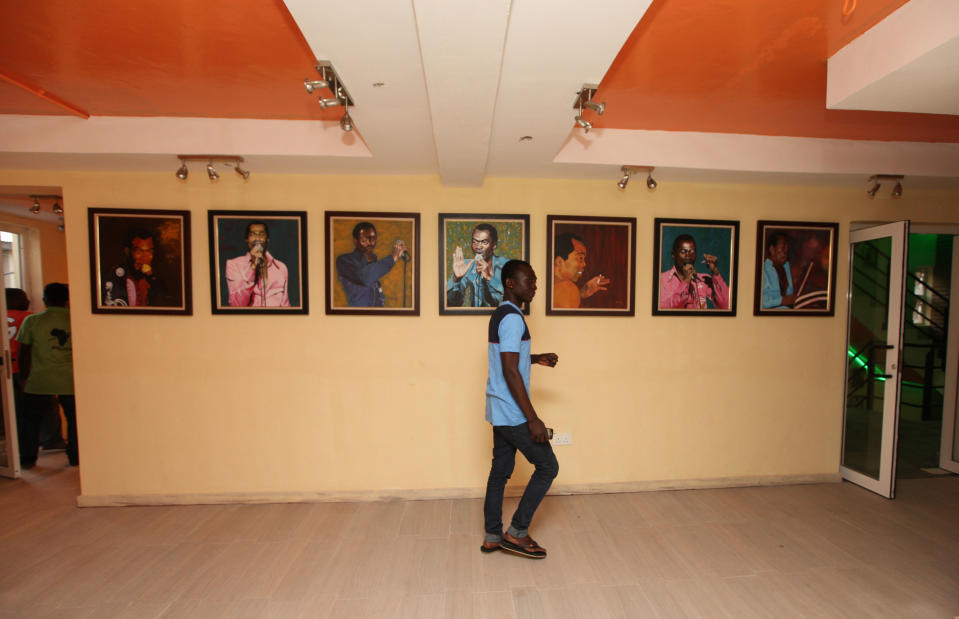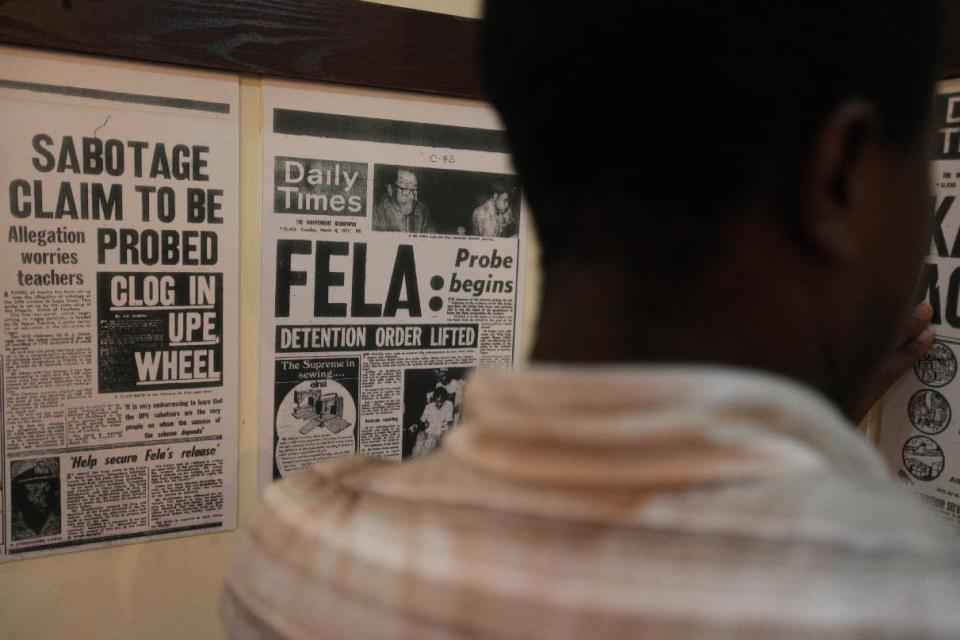New Nigeria museum fetes late Afrobeat singer Fela
LAGOS, Nigeria (AP) — "FELA LIVES," reads the Gothic-lettered tattoo on the back of one of the sons of the legendary Afrobeat singer from Nigeria. Fela Anikulapo-Kuti died 15 years ago but his name seems to be mentioned more now than ever.
Radio stations across Africa's most populous nation continue to play his trumpet-and-saxophone-infused songs, the girlish cries of his female backup singers ringing out of tinny speakers in crowded buses. Leaders he linked in songs to corruption remain close to the levers of power in this oil-rich but poverty-stricken country. He's a legend among unemployed gang members and academics alike and was the subject of a smash Broadway musical produced by some of the biggest celebrities in the U.S.
Now, the family house where his remains lie has become a government-endorsed museum that offers a look inside his life, as well as the challenges still facing Nigeria years after his death.
"In one of his songs, (Fela) said it takes 10 years for us to catch up to his message," said Theo Lawson, the architect who helped design the new museum. "The expectation, I think, would be that the people would rise up and demand their rights and this didn't happen because everybody was scared.
"Fela's been dead for 15 years and unfortunately, we're still where we are. It's probably longer than he anticipated."
Fela created Afrobeat in the late 1960s, mixing the rhythm of jazz, the catchiness of pop music and traditions of African mysticism into 10-minute-long songs riffing on politics and sex in a nation only recently freed from colonialism. He embraced the idea of pan-African leadership and openly criticized the military rulers who revolved in and out of power in Nigeria when others had been cowed into silence.
Many in Nigeria, at times a very religious and conservative nation, shied away from Fela over his heavily publicized sexual appetite and marijuana use. His escapades became the fodder for endless and titillating newspaper headlines, including marrying more than 20 women at the same time, living in a free-sex commune and smoking massive spliffs during performances. The military and police, never amused, conducted raid after raid on his home, which he declared the Kalakuta Republic. In one such assault, soldiers so severely beat Fela's mother, an activist in her own right, that she later died of her injuries.
Those government crackdowns, as well as disapproval of his lifestyle, stopped some Nigerians from accepting Fela, said Lemi Ghariokwu, who designed many of the musician's album covers. That coldness continued even after Fela died in 1997 of complications brought on by AIDS. The disease sapped his energy to perform in his last years, even though he dismissed AIDS in song and called safe sex "unnatural." His children since have been advocates of safe sex and AIDS awareness.
"If you go to Jamaica, there's a Bob Marley museum," Ghariokwu said, mentioning another singer with an affinity for marijuana. "The government of Jamaica gave Bob Marley (one of) its highest national honors, because they can see beyond."
While Fela's son Femi Kuti performs at The New Afrika Shrine, which is in honor of his father's former performance space, family and friends wanted a formal place to honor the musician. They decided to remodel the family home, which sits on a narrow street in Lagos' sprawling Ikeja neighborhood near the city's international airport. The Kalakuta Museum includes a wall holding Fela's shoes, photographs of him and his family, murals and album art. It also features his room as he left it at the time of his death, with VHS tapes, a giant inflatable globe and racks of clothes hanging above a simple twin bed. Pillows and a sheet lay nearby, a remembrance of how he slept on the floor, weakened as AIDS slowly killed him, Ghariokwu said.
On Monday, which would have been Fela's 74th birthday, his sons Seun and Femi and daughter Yeni celebrated the opening of the museum, which will include a boutique hotel and a rooftop lounge and concert space. The opening comes during Felabration, an annual week of concerts put on by his children to honor their father's musical legacy.
Lagos state government provided $250,000 for remodeling the home into a museum, Lawson said. Yet Femi Kuti made a point to say the family will continue to say whatever it feels like saying.
"We are not a family that is supporting the government, because of what my father stood for," he said. But he applauded local officials for "being brave enough to be identified with the name that many people fear and shy away from."
As he spoke, a giant diesel generator nearby kicked on, drowning out his words and showing how electric power remains out of reach for many in Nigeria. Later, someone tried to walk off with a pair of Fela's shoes from the racks hanging in the museum, a sign of the country's struggles with lawlessness.
But Fela's now-grown children laughed and smiled, shouted and waved as they walked past portraits showing them as infants with unlined faces. By the end, they rushed down several flights of stairs, champagne flutes in hand, laughing and calling out: "Soldiers coming!"
Below, their father's crypt sat just in front of the museum. A green bottle of schnapps lay on the tomb's steps, as if someone awaited his company for one more drink.
___
Jon Gambrell can be reached at www.twitter.com/jongambrellAP .







